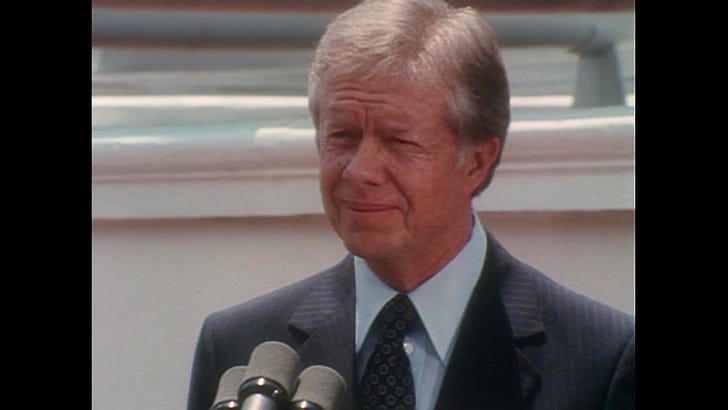Jimmy Carter’s solar panels & today’s political battles
What we can learn from a historical footnote
Welcome to a Sunday edition of Progress Report.
We’ll have a news-heavy edition of the newsletter for you on Monday; tonight, let talk about a significant turning point in history and build on our discussion of how corporate power stands in the way of progress.
Former President Jimmy Carter entered hospice care this weekend, choosing to spend his remaining days surrounded by family and friends instead of doctors and needles.
The days and weeks to come will be marked by tributes from the men and women that worked with or were inspired by the 39th president, though they will largely focus on the endlessly charitable and humble post-presidency that transformed Jimmy Carter into a beloved post-partisan national treasure. As always, what little is spoken about Carter’s time in office will likely focus largely on the low points, including stagflation and the Iranian hostage crisis.
History now acknowledges that he entered the White House during a period of international malaise, setting him up for a challenge bigger than one president. That said, Carter was responsible for exacerbating the economic pain felt by working people — he called it “sacrifice” — with a fiscal program of austerity and rules changes. Unemployment soared, and Carter, unwittingly or not, weakened labor unions years before Reagan fired those air traffic controllers and declared open season on organized labor.
There were high points of Carter’s presidency, of course. In 1979, Carter had 32 solar panels installed on the roof of the White House, a symbolic gesture meant to galvanize Americans to reach his ambitious goal of using alternative sources to supply 20% of the country’s energy consumption.
Those solar panels now stand as a symbol of what has happened in the United States over the past four decades, and offer critical lessons in how to win against the financial interests and right-wing politicians that dictate so much of American policy.
Keep reading with a 7-day free trial
Subscribe to Progress Report to keep reading this post and get 7 days of free access to the full post archives.





